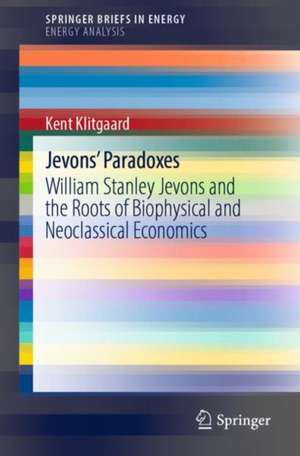Jevons' Paradoxes: William Stanley Jevons and the Roots of Biophysical and Neoclassical Economics: SpringerBriefs in Energy
Autor Kent Klitgaarden Limba Engleză Paperback – 18 ian 2022
In spite of this apparent contradiction, in this book biophysical economist Kent Klitgaard makes clear that there is no epistemological break between The Coal Question and Theory of Political Economy. Indeed, the Jevons paradox makes little sense in the absence of a behavioral theory grounded in marginal utility, which recognizes the satisfaction that each of us gains as consumers of one more unit of a good or service. Jevons could not solve this paradox in light of his belief that coal mines were becoming exhausted and more expensive to operate, and that there was no substitute for coal. However, he was uninterested in questions of sustainability; rather, he wanted to maintain British industrial and imperial dominance. Did the eventual substitution of oil for coal simply allow us to run through other resources at an accelerated rate? Indeed, the petroleum economy of the 20th and early 21st centuries has presented vastly expanded opportunities for the operation of the Jevons Paradox. This book shows the connections among the different paradoxes in Jevons’ work, and exposes the potentially fatal flaws that confound technological solutions to the sustainability challenge.
Din seria SpringerBriefs in Energy
-
 Preț: 345.89 lei
Preț: 345.89 lei -
 Preț: 345.89 lei
Preț: 345.89 lei -
 Preț: 376.04 lei
Preț: 376.04 lei -
 Preț: 377.35 lei
Preț: 377.35 lei -
 Preț: 476.42 lei
Preț: 476.42 lei -
 Preț: 343.36 lei
Preț: 343.36 lei -
 Preț: 374.85 lei
Preț: 374.85 lei -
 Preț: 376.59 lei
Preț: 376.59 lei -
 Preț: 477.72 lei
Preț: 477.72 lei -
 Preț: 176.35 lei
Preț: 176.35 lei -
 Preț: 380.07 lei
Preț: 380.07 lei -
 Preț: 376.22 lei
Preț: 376.22 lei -
 Preț: 377.95 lei
Preț: 377.95 lei -
 Preț: 376.43 lei
Preț: 376.43 lei -
 Preț: 377.73 lei
Preț: 377.73 lei -
 Preț: 343.00 lei
Preț: 343.00 lei -
 Preț: 377.35 lei
Preț: 377.35 lei -
 Preț: 377.95 lei
Preț: 377.95 lei -
 Preț: 444.35 lei
Preț: 444.35 lei -
 Preț: 348.84 lei
Preț: 348.84 lei -
 Preț: 412.30 lei
Preț: 412.30 lei -
 Preț: 377.73 lei
Preț: 377.73 lei -
 Preț: 375.62 lei
Preț: 375.62 lei -
 Preț: 380.07 lei
Preț: 380.07 lei -
 Preț: 376.80 lei
Preț: 376.80 lei -
 Preț: 376.22 lei
Preț: 376.22 lei -
 Preț: 479.67 lei
Preț: 479.67 lei - 15%
 Preț: 463.85 lei
Preț: 463.85 lei -
 Preț: 476.79 lei
Preț: 476.79 lei -
 Preț: 375.23 lei
Preț: 375.23 lei -
 Preț: 379.09 lei
Preț: 379.09 lei -
 Preț: 376.22 lei
Preț: 376.22 lei -
 Preț: 409.43 lei
Preț: 409.43 lei - 15%
 Preț: 462.38 lei
Preț: 462.38 lei -
 Preț: 414.21 lei
Preț: 414.21 lei -
 Preț: 375.62 lei
Preț: 375.62 lei -
 Preț: 374.30 lei
Preț: 374.30 lei -
 Preț: 376.22 lei
Preț: 376.22 lei - 15%
 Preț: 463.35 lei
Preț: 463.35 lei -
 Preț: 381.72 lei
Preț: 381.72 lei -
 Preț: 379.09 lei
Preț: 379.09 lei -
 Preț: 375.62 lei
Preț: 375.62 lei - 15%
 Preț: 463.35 lei
Preț: 463.35 lei -
 Preț: 376.80 lei
Preț: 376.80 lei -
 Preț: 374.46 lei
Preț: 374.46 lei -
 Preț: 477.56 lei
Preț: 477.56 lei -
 Preț: 379.48 lei
Preț: 379.48 lei -
 Preț: 374.30 lei
Preț: 374.30 lei -
 Preț: 479.47 lei
Preț: 479.47 lei -
 Preț: 378.12 lei
Preț: 378.12 lei
Preț: 345.89 lei
Nou
Puncte Express: 519
Preț estimativ în valută:
66.19€ • 70.78$ • 55.18£
66.19€ • 70.78$ • 55.18£
Carte tipărită la comandă
Livrare economică 18 aprilie-02 mai
Preluare comenzi: 021 569.72.76
Specificații
ISBN-13: 9783030935887
ISBN-10: 3030935884
Pagini: 120
Ilustrații: XVIII, 120 p. 11 illus., 1 illus. in color.
Dimensiuni: 155 x 235 mm
Greutate: 0.2 kg
Ediția:1st ed. 2022
Editura: Springer International Publishing
Colecția Springer
Seriile SpringerBriefs in Energy, Energy Analysis
Locul publicării:Cham, Switzerland
ISBN-10: 3030935884
Pagini: 120
Ilustrații: XVIII, 120 p. 11 illus., 1 illus. in color.
Dimensiuni: 155 x 235 mm
Greutate: 0.2 kg
Ediția:1st ed. 2022
Editura: Springer International Publishing
Colecția Springer
Seriile SpringerBriefs in Energy, Energy Analysis
Locul publicării:Cham, Switzerland
Cuprins
Good Jevons, Bad Jevons: William Stanley Jevons and the Roots of Neoclassical and Biophysical Economics.- Jevons the Empiricist: Gold; Coal; and Sunspots.- Jevons the Theorist: The Theory of Political Economy and the Roots of Neoclassical Economics.- Energy, Labor, and the Industrial Revolution.- Conclusion: Jevons’ Many Paradoxes and Thoughts for the Future.
Notă biografică
Kent Klitgaard is a Professor Emeritus of Economics and Sustainability at Wells College, having just retired from a thirty-year teaching career.
Kent is the co-author, in collaboration with Charlie Hall, of Energy and the Wealth of Nations, co-founder of the International Society of Biophysical Economics, and a board member of the Biophysical Economics Institute. He is the proud father of two adult children who have eschewed the corporate road to wealth in order to do good for the world.
Caracteristici
Uses Jevons' multiple paradoxes to develop an economic theory appropriate to the end of the fossil fuel era Analyzes sustainability within the framework of Jevons‘ paradoxes Explains why technological solutions alone are unlikely to meet the sustainability challenge
